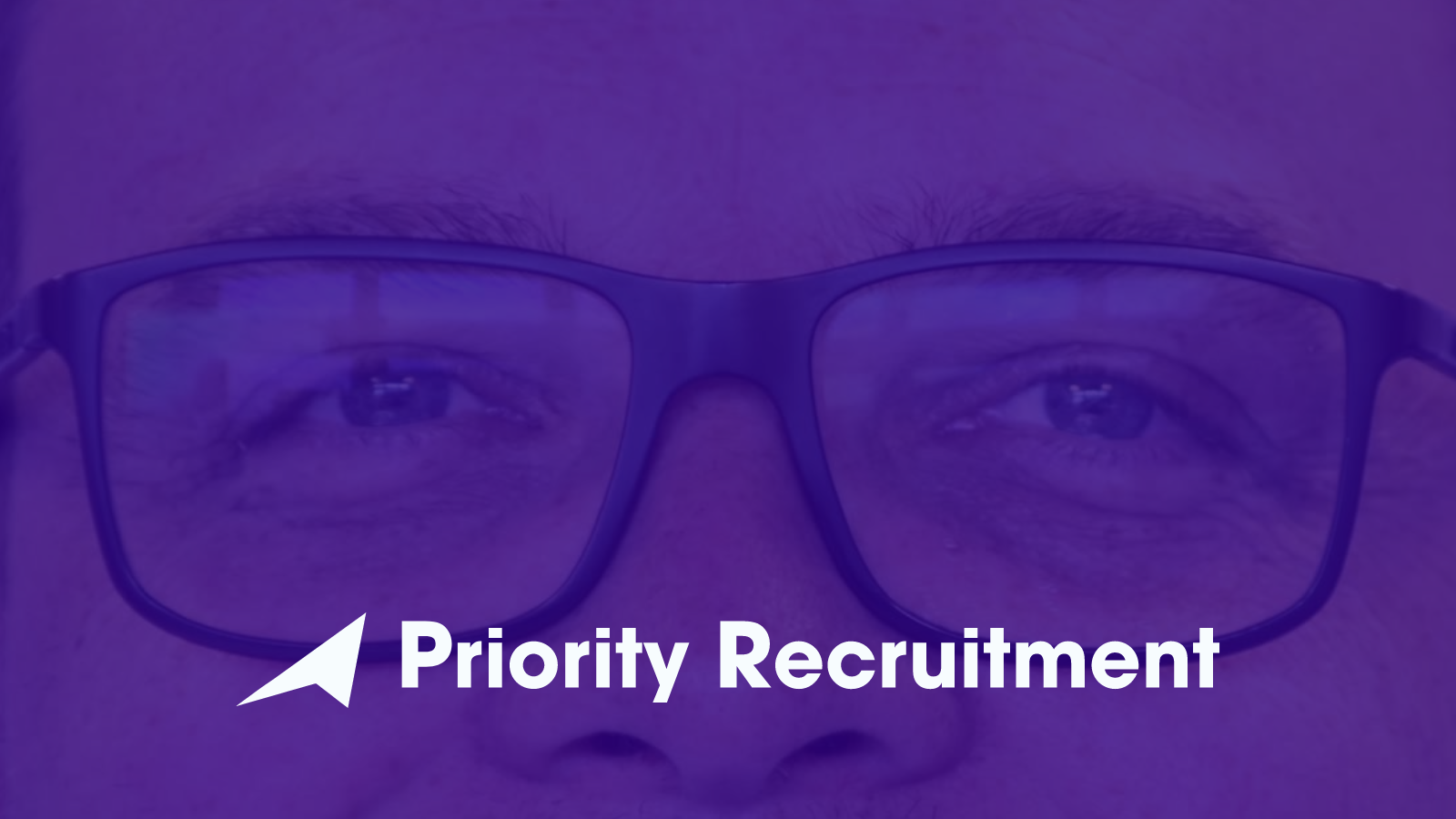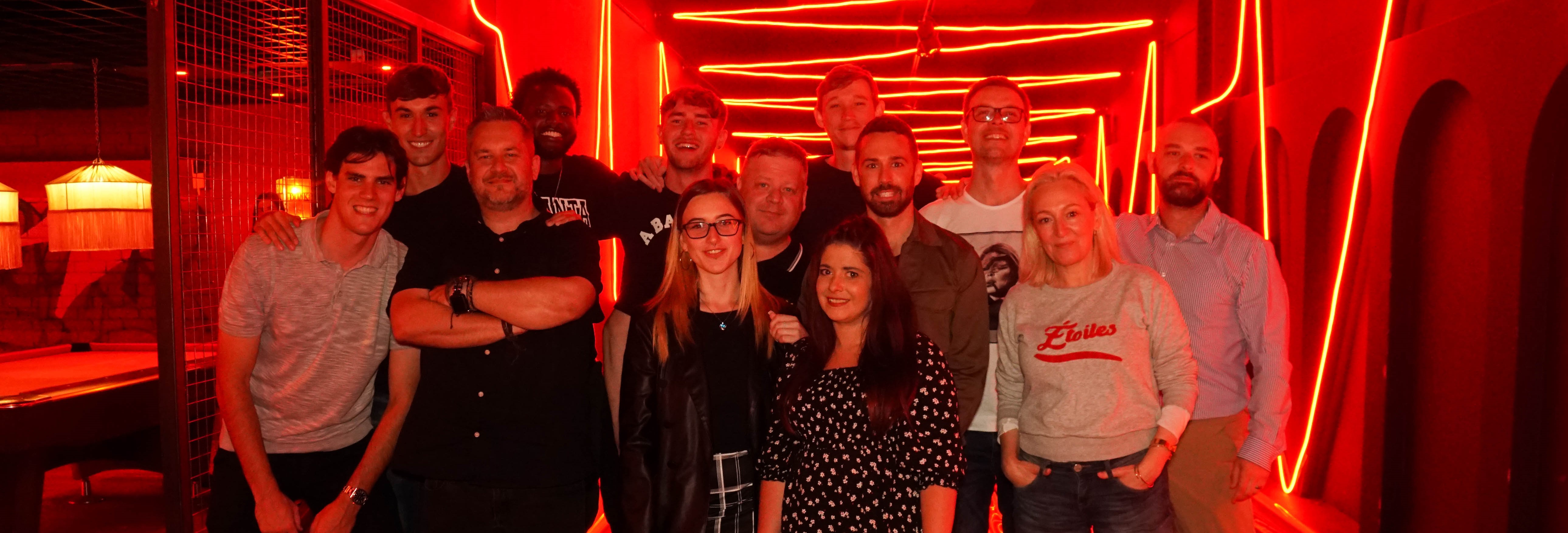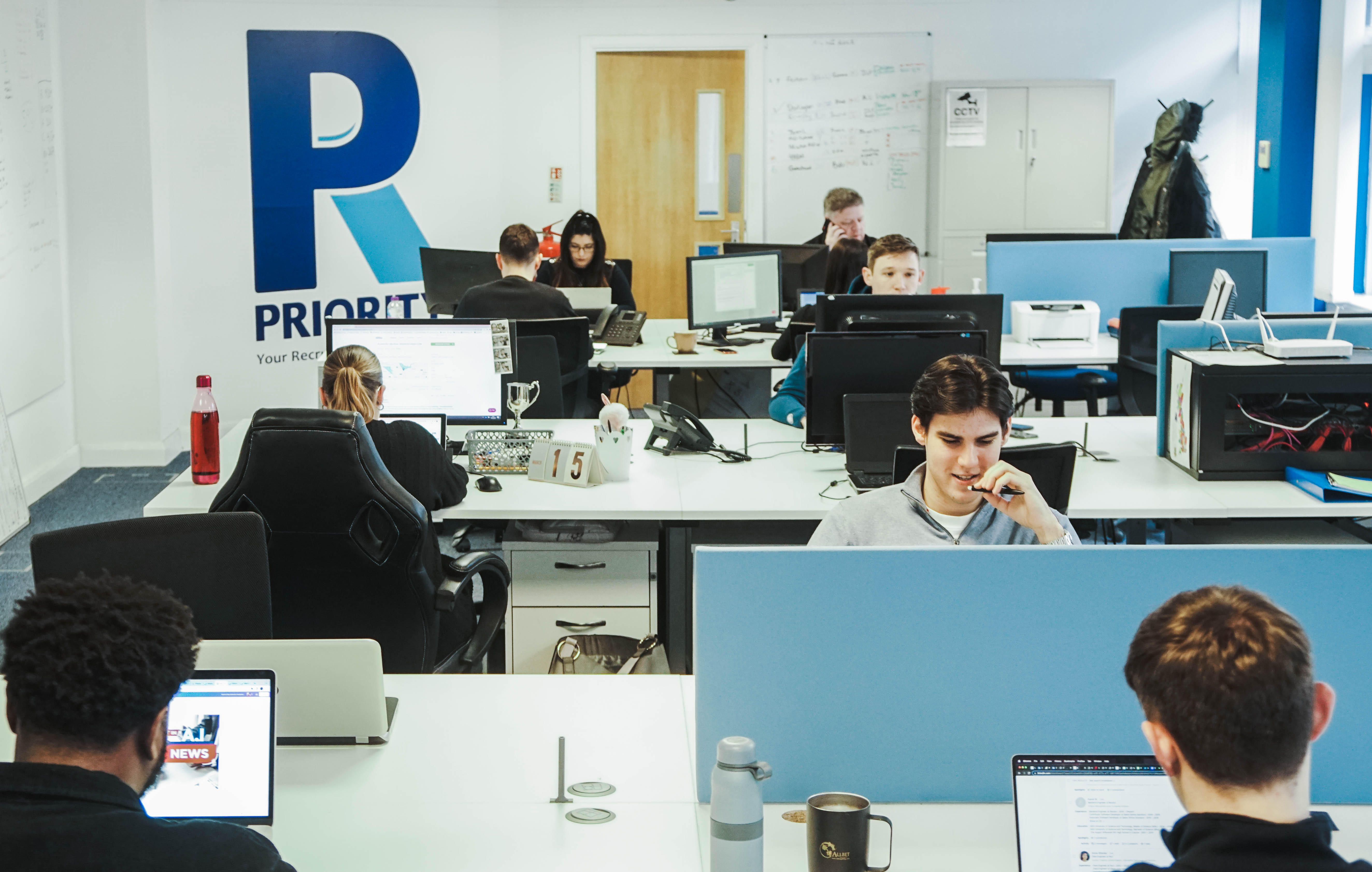Site Owner
Grace, Support Worker
"I am glad to work for an employer as good as Priority and cannot thank each and every member of staff for being equally helpful and assisting throughout my journey with you so far. I look forward to working with you every year and as long as I can."
February marks LGBTQ+ History Month, and this year's theme, #UnderTheScope, shines a much-needed spotlight on the incredible contributions of LGBTQ+ individuals to medicine and healthcare. From groundbreaking research to tireless advocacy, their stories illuminate the vital role queer people have played in shaping a healthier future for all.
1. Magnus Hirschfeld (1868-1935)
 `
`
A German physician and pioneering sexologist, Hirschfeld founded the world's first Institute for Sexual Science in Berlin. He challenged prevailing views on homosexuality and tirelessly advocated for LGBTQ+ rights, tragically facing persecution under the Nazi regime.
2. Sophia Jex-Blake (1840-1912)
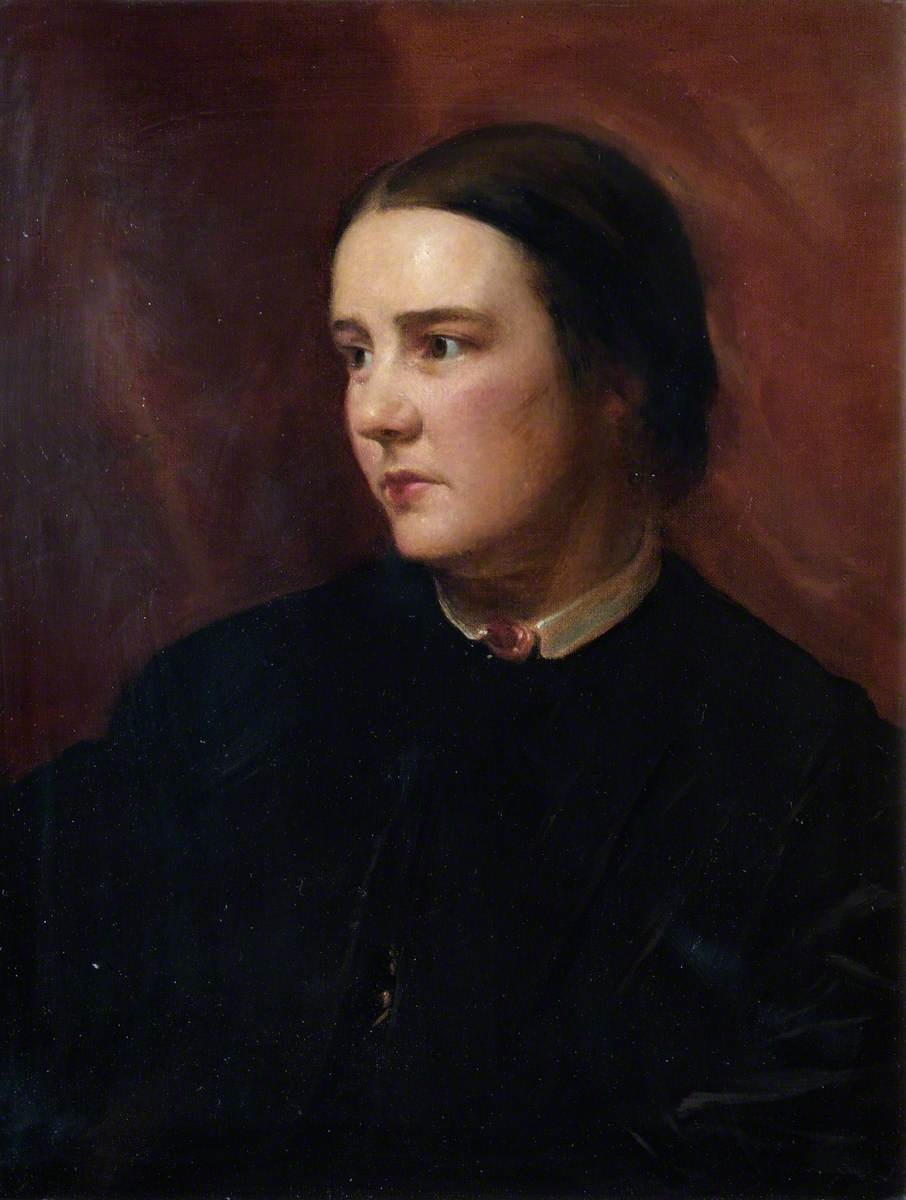
This fearless physician and feminist shattered academic barriers, paving the way for women's access to medical education. In 1869, alongside six other brave women known as the "Edinburgh Seven," she defied societal norms and enrolled in the University of Edinburgh's medical program. Despite facing intense opposition and even physical violence from students and the public, Jex-Blake persevered. Though denied a degree from Edinburgh, she pursued her studies abroad and became one of the first licensed female doctors in the UK. She never married and lived with her long-term partner Dr Margaret Todd till her death.
3. Audre Lorde (1934-1992)
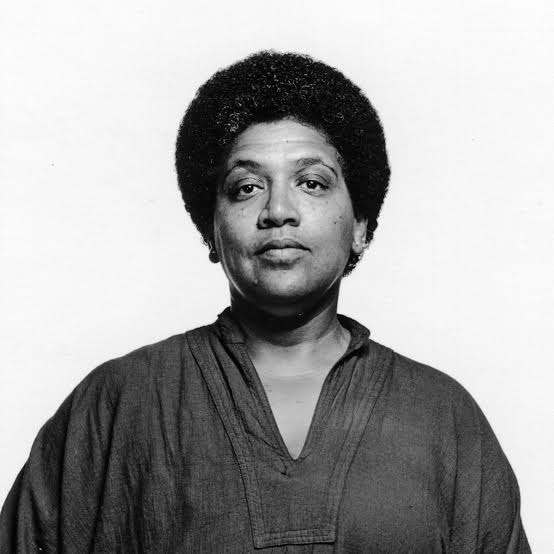
A Black lesbian feminist poet and activist, Lorde used her powerful voice to advocate for healthcare equity for LGBTQ+ people, particularly focusing on the needs of Black women. Her work highlighted the intersection of race, gender, and sexual orientation in healthcare disparities.
4. Cecil Belfield Clarke (1894-1970)

A Barbadian-born physician who practised in London, Cecil Belfield Clarke transcended the boundaries of medicine to become a champion for Pan-Africanism and racial equality. Born in 1894, he overcame societal barriers to qualify as a doctor in the UK, setting up practice near Elephant & Castle where he served the community diligently for nearly 50 years. But Clarke's passion extended beyond patient care. He co-founded the League of Coloured Peoples in 1931, becoming a vocal advocate for the rights of Black communities in Britain and beyond.
Clarke was homosexual. As was usual before decriminalisation in 1967, Clarke was discreet. His lifelong partner was Pat Walker (Edward George Walker, 1902–1999), whom Clarke employed as his secretary. Clarke's unwavering dedication to fighting racial prejudice and promoting Pan-African ideals earned him recognition as a pioneer in both the medical and civil rights fields, leaving a lasting legacy of activism and empowerment.
5. Margaret "Meg" Stacey (1922-2004)

A trailblazer in British sociology, shattered academic barriers and advocated for marginalised communities throughout her illustrious career. As a leading figure in establishing sociology as an academic discipline, Stacey dedicated her research to understanding health, illness, and inequality. Known for her groundbreaking studies on mental health, family life, and the medical profession, she championed critical perspectives and in-depth fieldwork, paving the way for future generations of sociologists. Moreover, Stacey actively used her knowledge to inform policy and improve the lives of marginalised groups, serving as a lay member of various healthcare and medical ethics committees. She lived with her partner Jennifer Lorch for many years. Recognised for her insightful scholarship and unwavering commitment to social justice, Professor Stacey's legacy inspires sociologists and advocates fighting for a more equitable society.
6. Sir Ewan Forbes (1912-1991)

Sir Ewan Forbes carved out a complex and fascinating life defying societal expectations. Though assigned female at birth, he identified and lived as a man from a young age, navigating a world largely unaccepting of transgender identities. Despite social pressures, he embarked on a successful medical career, earning his degree in 1944 and serving as a general practitioner and farmer. However, his most notable act of defiance came in 1965 when he inherited his baronetcy. Facing legal challenges due to his gender identity, Ewan launched a landmark case that ultimately affirmed his right to the title. This groundbreaking court battle, dubbed "The Hidden Case," paved the way for greater recognition and legal protections for transgender individuals in the UK. Though a private man later in life, Ewan's legacy shines brightly as a pioneer who not only fought for his own personal identity but also contributed to wider societal progress towards inclusivity and understanding.
7. Cherry Valentine/George Ward (1993-2022)

Captivating drag queen and dedicated mental health nurse, Cherry Valentine blazed a trail of self-expression and community advocacy. Born in 1993, they rose to prominence after captivating audiences on RuPaul's Drag Race UK in 2020. Cherry Valentine's vibrant performances ignited conversations about identity, representation, and the power of drag. Beyond the stage, they leveraged their platform to champion mental health awareness, drawing on their own experience as a nurse to educate and destigmatise mental health struggles. With vulnerability and compassion, Cherry Valentine created documentaries and facilitated workshops, reaching countless individuals and contributing to a more inclusive and understanding society. They tragically died of suicide in 2022. Their legacy resonates in the hearts of the LGBTQ+ community and beyond, reminding us to celebrate self-expression and fight for a world where everyone feels empowered to be themselves.
There's still more left to do
These are just a few of the countless LGBTQ+ individuals who have made invaluable contributions to medicine and healthcare. Shining a light on their stories during #UnderTheScope is not just about celebrating the past; it's about highlighting the ongoing struggles faced by queer communities in accessing equitable healthcare.
Despite the tireless efforts of LGBTQ+ pioneers, stark disparities in healthcare remain:
- 50% of LGBTQ+ people have experienced depression, compared to 1 in 6 in the general population.
- 60% have suffered from anxiety, compared to 31% of the general population.
- 1 in 7 LGBTQ+ individuals avoid seeking healthcare due to fear of discrimination.
- 46% of trans people have reported thoughts of suicide in the past year, highlighting the specific challenges faced by this community.
- Nearly half of trans individuals have encountered discriminatory or negative remarks from healthcare staff.
These sobering statistics underscore the urgent need for:
- Improved access to culturally competent and inclusive healthcare services.
- Comprehensive healthcare reforms to address mental health needs and tackle discrimination.
- Greater awareness and sensitivity among healthcare providers towards the specific needs of LGBTQ+ individuals.
- By honouring the legacy of the pioneers who fought for healthcare equality and addressing these disparities head-on, we can create a healthcare system that truly serves everyone, regardless of sexual orientation or gender identity.
Current research reveals persistent disparities in health outcomes for LGBTQ+ people. Higher rates of mental health issues, discrimination in healthcare settings, and inadequate access to gender-affirming care are just some of the challenges faced. Bringing attention to these issues is crucial for creating a more inclusive and equitable healthcare system.
As we celebrate LGBTQ+ History Month, let us remember the pioneers who paved the way, amplify the voices calling for change, and strive to create a healthcare system that embraces and nurtures the health and well-being of all, regardless of sexual orientation or gender identity. #UnderTheScope is not just a hashtag; it's a call to action, urging us to ensure that everyone has access to the healthcare they deserve.
_________________
Check out the links below to make a real difference this History Month:
The Proud Trust – supports LGBTQIA+ young people through youth groups, peer support, mentoring schemes and a webchat.
LGBT Foundation – advice, support and information for people identifying as LGBT+.
Mermaids UK supports transgender, nonbinary and gender-diverse young people up to 18. Runs local groups, online courses and has a webchat.
Stonewall – information and advice for LGBT+ people on a range of issues.
Switchboard - National LGBTQ+ Support Line - listening services, information and support for LGBT+ people.
Bin the Blues, Embrace Possibilities: Blue Monday and Mental Wellbeing at Priority Recruitment
Ah, January. The month of crackling fires, frosty mornings, and… Blue Monday? This manufactured moniker for the supposedly grimmest day of the year does more than cast a shadow on a perfectly decent Monday – it trivialises the very real struggles millions face daily.
Instead of succumbing to fabricated gloom, let's embrace January as a fresh start, a time for positive change and blooming possibilities. At Priority Recruitment, we champion mental wellbeing not just in January, but all year round. That's why we stand firmly against the Blue Monday myth and actively promote open conversations about mental health.
Remember, Blue Monday was born in 2005 as a catchy marketing ploy, not a scientific fact. Its "formula" for the most depressing day of the year, riddled with dubious factors like post-festive blues and weather woes, was swiftly debunked by scientists and mental health professionals.
Why this "Science" Belongs in the Rubbish Bin:
- Trivialising Depression: Depression is a serious medical condition, not a fleeting case of the January blues. Jokes about Blue Monday minimize the pain and isolation experienced by those battling depression, potentially preventing them from seeking help.
- Fuelling Stigma: Blue Monday perpetuates harmful stereotypes about depression, making it harder for people to come forward and seek support.
- No Scientific Backing: The "Blue Monday formula" is riddled with holes and has been widely criticised by the scientific community. There's no evidence to suggest that one day is inherently more depressing than any other.
Instead of Fearing Monday, Embrace January as a Fresh Start
At Priority Recruitment, we're committed to building a supportive and inclusive environment. That's why we're proud to partner with Manchester Mind, a fantastic organisation dedicated to promoting mental wellbeing in our community. Manchester Mind offers a range of services, including one-to-one support, group activities, and online resources.
Together, we're working to break down stigma and create a world where everyone feels comfortable talking about mental health and seeking the support they need.
And remember, if you or someone you know is struggling, please reach out. You're not alone.
Here are some helpful resources:
Manchester Mind: https://www.manchestermind.org/
Mind: https://www.mind.org.uk/
The Samaritans: https://www.samaritans.org/
The Mix: https://www.themix.org.uk/
Anxiety UK: https://www.anxietyuk.org.uk/
Rethink Mental Illness: https://www.rethink.org/
By working together, we can create a world where everyone feels comfortable talking about mental health and seeking the support they need. Let's make January, and every month, a time for hope, healing, and connection.
Learn more about our charity partnerships here.
How to ace your video job interview
It is no secret the COVID pandemic has forced organisations to adapt to new ways of working with technology playing a huge role in all aspects of our “new norm”.
A survey conducted by LinkedIn showed that 81% of talent professionals agreed that virtual recruiting will continue past COVID and 70% believe it will become the new standard.
So, what does that mean for you when attending an interview? Sure, there are some similarities to a traditional face-to-face meeting, however, there are some vital finer details that you may overlook which all count to making that lasting first impression.
Things To Consider...
- Remove Distractions
Confine and immerse yourself in a secluded area where there is little to no chance of distractions occurring. Ensure anyone in the household is aware of your video interview and where you will be to avoid a mishap. Making sure your dogs are well-walked and fed is another useful tip! - Appropriate Background
Keep your backdrop either simple or appropriately creative, most applications such as Zoom, Teams and Skype offer the opportunity to create your own digital background, blurring out reality if this is not possible. - Room Lighting
A very important factor in a video interview, nobody wants to have to battle with dark shadows or sunlight distorting your visibility and risk affecting the interview. Ensure to choose a well-lit location, which may include a key light that shines at the correct camera angle. - Technology Test
Whether you are using a laptop, desktop, or tablet – make sure to check your technology is in full working order in advance of the interview. This includes your audio, video, and Wi-Fi quality. - Dress Code
Dressing to impress implies in all circumstances and video interviews are no different. Okay, you generally will only show the top half, but who wants to risk the camera falling or you standing up for the interviewer to see your PJs? Now that would not make the best impression, question marks would be raised about your professionalism and commitment to the job. Not only that but surveys show that your mindset will greatly improve by dressing professionally for your interview. - Headphones
If you were to prioritise the importance of all features in a video interview, then audio would be at the top. Sure, your video would be important, but there is nothing worse than crackly audio or background noise where the interviewer cannot understand what you’re saying. Investing in a sound-cancelling headset with a built-in microphone is always one of the best options. - Eye Contact / Body Language
Again no different, but looking into the interviewer's eyes on your screen when your webcam is 10 feet above will look like you're looking at the floor! Ensure your camera is facing you directly near the display.
If you are nervous about your first video interview, why not practice with us? Drop us an email here and we can arrange a video chat where you can practice, and set up your kit in the right location and receive some feedback.
As we approach the end of the original furlough scheme, more and more people will find themselves seeking employment. A position that for some will be a shock, others anticipated but for the majority, it will have been a long while since they looked for a new job and potentially outside of an industry they had recently worked in.
The world has changed when it comes to searching for a new role and right now it is harder than ever, here at Priority we have created a supporting guide for those who are now looking for work, it is an unbiased support aid to cover everything from creating a CV, where to look for work and what type of interview you may have to attend.
If you are unemployed or facing unemployment this guide will help you. keep positive, and treat looking for a job as a full-time job from day one! 8 hours a day 5 days a week, it's tough and will continue to be tough, but it's what you need to do to find a role in the current climate and will be the attitude you need to stand out from the ever-growing crowd.
Check out this fantastic document with advice on searching, and applying for jobs by Daniel Franklin:
_______________
You can also read our CV tips & template here, and our interview prep guidance here.
How to... do a SWOT analysis
As part of a job interview process, you might be asked to do a SWOT analysis. Not sure where to start? Read on!
Managerial candidates may be asked to complete a SWOT on one of a range of topics, to demonstrate their industry knowledge. Topics to be looked at often include;
- Self-facing (Candidate)
- Potential employer (specific retail/healthcare location or wider business)
- Potential employer competitor (as above)
How To Do: SWOT Analysis
A SWOT Analysis is a tool that is used to analyse an individual, location, brand or business’s situation and does this by breaking it down into four different sections which review the subject's Strengths, Weaknesses, Opportunities and Threats.
Typically a SWOT will be built on the knowledge/insight gained during a mystery shop. You should of course be covert and also respectful during a mystery shop. Whilst directly engaging with an employer about your purpose might sound sensible, it may reveal that a process is going on that they were previously unaware of!
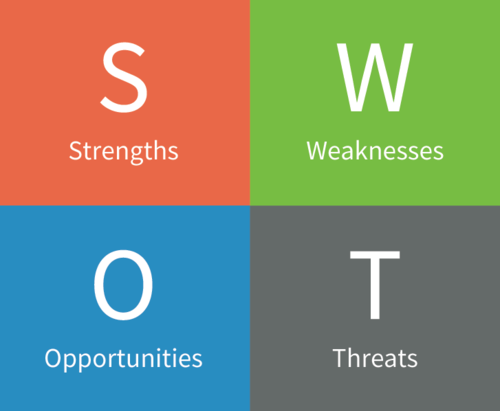
Initially, the layout is straightforward, whether you are handwriting, writing a Word document or even producing a PowerPoint, ultimately there will be 4 headers - the 4 elements of SWOT.
The first section focuses on the topic's internal Strengths that they can manage. This is the section that allows you to identify what they do well and perhaps is different in comparison to their competitors; what gives them that edge? Your first initial strengths will be some of the most important due to this also being what the customers will spot straight away. However, once you have seen through the initial strengths you then get the opportunity to dig deeper to find out what else they do well. Things such as food quality, customer service, prices, staff appearance or business merchandising standards.
The second section focuses on the topics internal Weaknesses that they can manage, control and change. This section allows you to identify areas of the business which aren’t doing so well but that the business is in control of and could change. These are the topic's weaker points which could be based on customer service skills, cleaning skills or things such as merchandising standards.
The third section focuses on the subject's external Opportunities. This is where you need to think outside of the box and examine what potential opportunities there are to grow, improve etc. Examples of what chances you think the business can/should take or changes the business may have to make to be able to improve, compete or simply survive in a very difficult economic climate. This is where you take external factors such as their competitors, market trends and business events and use them to the business's advantage by trying to replicate what success looks like to that business specifically to make a positive change.
The final section focuses on the business's external Threats. In this part of the SWOT, you must analyse what threats can oppose the business. Threats can include new Laws and Regulations, business competition, new business openings (the Internet!) and upcoming market trends. Analysing these is important to the business as it helps the business to get in front of the threats before they start to damage the business.
Overall, the Swot analysis is used to review an individual or business's performance and help them to get in front of any potential problems. Businesses like to get their potential employees to complete these as it helps them to see their business from a different perspective, we ask our candidates to be constructive and positive with any recommendations that come from a SWOT analysis; a PowerPoint presentation or even some notes on a page; the SWOT analysis is about the quality of the content and delivering the message in a positive way. Even if you are not asked to complete one anyone considering Management roles should go out of their way and aim for an edge over their competition, what better way to do this than to provide detailed and specific market analysis for that business.
Common Mistakes
- One typical mistake that people make when completing a SWOT is looking in detail/depth at something that falls outside of the their "Circle of Control or Influence" - For example stating that the brand name isn't great, or the restaurant is poorly located inside the store - these are things that do not fall within a typical store managers control or influence, they should not be focussed on. Better to focus on something that as the newly hired manager, you could use your skills, strengths and abilities to control, influence and therefore naturally - Improve!

- Not being negative (constructively) - Candidates often use SWOT as an opportunity to tell their prospective employer how wonderful they are... this is not what it is for! You are likely to be speaking with a senior manager who will already be aware of the faults within a specific location (maybe that is why they are hiring a new manager.... ?) - If the potential candidate is not able to demonstrate their competency, capability and industry experience through the SWOT, they are giving themselves an uphill battle in the interview. It is imperative to highlight issues you see, however, this must be done whilst factoring in the circles of influence advice above and done constructively.
- Take a spare copy! Especially if your analysis is long, make sure you take a spare copy, so that you can leave it behind. It may be that you don't get a chance to read through the whole thing during the interview, so essential to take a spare copy to leave behind.
Max’s Journey from Mobile Phone Store to Senior Recruitment Consultant
In the bustling world of recruitment, every consultant has a unique story that shapes their career. For Max Roberts, a Senior Recruitment Consultant at Priority Crypto, the journey began in Rainford, St Helens, where he found himself working in a mobile phone store at the age of 16 while still finishing school.
After completing his degree in Business Economics at the University of Leeds, Max's path took an unexpected turn. Unsure of his career direction, he delved into the world of blockchain and crypto during his final year, engaging in extensive research and investments.
The Call that Changed Everything: Anders, Crypto, and Priority
The turning point in Max's career occurred through mutual friends. Anders Christiansen, the Managing Director of Priority Recruitment, reached out to discuss the newly founded crypto division at Priority Recruitment. The call sparked Max's interest, and Alex, another team member, continued to encourage him to join Priority. Despite never considering recruitment as a career, Max saw an opportunity to align his newfound passion for crypto with a dynamic and growing team.
The Early Days: From Retail to Crypto Recruiting
Max's initial months at Priority were a learning curve. Starting in the retail team, he immersed himself in recruitment fundamentals—making calls, resourcing, and adapting to the fast-paced environment. The transition to crypto recruiting brought new challenges and successes, with at least three placements a month at its peak.
However, the market crash in May 2022 posed unforeseen challenges. Clients entered defensive mode, and the once-bustling hiring landscape dwindled. The subsequent months became a consolidation period for Max and his team, navigating uncertainties and learning to thrive in a challenging market.
Adapting and Thriving: Max's Reflections on Challenges and Successes
Max faced challenges head-on, becoming a technical recruiter and navigating uncharted territories within the blockchain and crypto industries. The shift to remote recruitment brought new hurdles, such as verifying the identity of candidates in dev shops.
Despite the obstacles, Max found success in connecting with top-tier professionals from tech giants like Google and Microsoft, who expressed a desire to work in innovative start-ups. He relished the chance to impact rogue industries and make a tangible difference.
Global Experiences: From Thailand to Dubai
Max's journey at Priority has taken him beyond geographical boundaries. Working with a client in Thailand left a lasting impression, emphasising the industry's global impact. Networking in Dubai exposed Max to the wider blockchain community, providing valuable insights and connections.
However, the path wasn't without its share of the regular recruitment challenges, including candidates lying and ghosting. Despite these obstacles, Max remains optimistic about the opportunities for growth and impact that Priority Recruitment continues to provide.
Looking Ahead: Max's Vision for the Future
As Max envisions his career progressing, he aims to lead a team within the next 12-18 months. His ambition extends beyond personal success; he envisions a thriving market that allows for team expansion, taking on the responsibility of guiding others.
In Max Roberts, Priority Recruitment has not only gained a seasoned professional but also a testament to the company's commitment to cultivating talent and navigating the dynamic landscape of recruitment with resilience and innovation.
_______________
Are you inspired by Max’s story? Check out our career page to see how you can join our team and make your career awesome!
Blue pumpkins have become more than just a unique decoration during the autumn season; they serve as a symbol of support and understanding for individuals living with autism.
Read on to find out more about the meaning behind the blue pumpkins and how they contribute to creating an inclusive and autism-friendly environment.
Understanding the Symbolism
Blue is often associated with calmness and tranquility, and it's also the primary color used to represent autism awareness. During October, which is National Bullying Prevention Month, families of individuals with autism often place blue pumpkins on their doorsteps as a symbol of solidarity and acceptance.
The blue pumpkin serves as a beacon, indicating that the household is a safe, understanding, and accommodating place for those with autism. It tells parents, caregivers, and individuals on the spectrum that they can approach without fear of judgment or misunderstanding.
But blue pumpkins are not only for decoration; they can also be used as a practical tool by non-verbal children with autism who go trick-or-treating. Carrying a blue pumpkin or wearing a blue pumpkin-themed accessory can communicate to those handing out treats that the child may have difficulty speaking or interacting with others in a way we would expect from neurotypical children. This helps the child and their caregivers have a more inclusive and enjoyable Halloween experience.
How Blue Pumpkins Help
1. Reducing Sensory Overload
Blue pumpkins signify that the residents are aware of the sensory challenges individuals with autism may face. They may dim lights, keep noise levels down, and avoid sudden loud noises to create a more comfortable environment.
2. Inclusive Trick-or-Treating
For many children with autism, the sensory experiences of Halloween can be overwhelming. Houses with blue pumpkins may offer alternative treats or a quieter, more accommodating trick-or-treating experience.
3. Fostering Acceptance
By displaying a blue pumpkin, individuals and families are not only showing their support but also encouraging conversations about autism. This helps raise awareness and promotes a more inclusive and understanding community.
Blue pumpkins are more than just a seasonal decoration; they're a powerful symbol of acceptance and support for those living with autism. By displaying a blue pumpkin on your doorstep during the autumn, you can contribute to creating a welcoming and inclusive atmosphere for individuals on the spectrum. This simple act goes a long way in fostering a more compassionate and understanding society for everyone, regardless of their unique abilities.
In a world that is often filled with challenges, the blue pumpkin reminds us that small acts of kindness and understanding can make a world of difference for those living with autism and their families. So, this Halloween season, consider joining the movement and proudly displaying a blue pumpkin to show your support for autism awareness. Together, we can make a positive impact, one pumpkin at a time.
_____
As part of our healthcare division, we support clients living with autism and other conditions. Learn more about what we and our Support Workers do to make a difference.
World Cerebral Palsy Day is a day to raise awareness and understanding about cerebral palsy (CP), a condition that affects millions of people around the world. CP is a complex neurological disorder that can impact a person's motor skills and muscle control. It's crucial to increase awareness about this condition, dispel myths, and promote inclusivity and support for those living with CP. In this article, we'll explore seven essential things you need to know about cerebral palsy.
1. Cerebral Palsy Is Not a Disease
First and foremost, it's essential to understand that cerebral palsy is not a disease. It is a lifelong neurological condition that affects a person's movement and muscle coordination. CP is caused by damage to the developing brain, often occurring before or during birth, but sometimes it can also happen in early childhood. This damage can result from various factors, including genetic mutations, infections during pregnancy, or oxygen deprivation during birth.
2. CP Is a Spectrum
Cerebral palsy is not a one-size-fits-all condition. It exists on a spectrum, and its effects can vary widely from person to person. Some individuals with CP may have mild symptoms and lead relatively independent lives, while others may have severe motor impairments that require ongoing care and support. It's essential to recognise and respect this diversity within the CP community.
3. Early Intervention Is Critical
Early diagnosis and intervention are crucial for individuals with cerebral palsy. The sooner CP is identified, the more effective treatments and therapies can be in helping individuals reach their full potential. Various therapies, such as physical, occupational, and speech therapy, can greatly improve the quality of life for those with CP by enhancing their mobility, communication, and independence.
4. Inclusive Education Is Essential
Inclusive education is a key component of providing equal opportunities for individuals with cerebral palsy. Every child deserves access to quality education, regardless of their abilities. Inclusive schools and classrooms create an environment where children with CP can learn alongside their peers, fostering social inclusion and promoting a more accepting society.
5. Assistive Technology Can Make a Difference
Advances in technology have opened up new possibilities for people with cerebral palsy. Assistive technology, including communication devices, mobility aids, and computer software, can greatly enhance independence and accessibility. These tools empower individuals with CP to communicate effectively, access information, and participate more fully in everyday life.
6. Supportive Communities Are Vital
Living with cerebral palsy can be challenging, both for individuals with CP and their families. Supportive communities and networks play a crucial role in providing emotional, practical, and informational support. These communities can help individuals and their families navigate the complexities of living with CP, share experiences, and promote a sense of belonging.
7. Advocacy and Awareness Are Ongoing
Finally, it's important to recognise that advocacy and awareness efforts for cerebral palsy should be ongoing. World Cerebral Palsy Day is just one day, but the need for understanding, acceptance, and support lasts throughout the year. By raising awareness, challenging stereotypes, and advocating for the rights of individuals with CP, we can work towards a more inclusive and compassionate society.
___________
At Priority Recruitment, we are proud to be collaborating with case management companies across the UK and supporting countless clients living with cerebral palsy. Learn more about our healthcare recruitment solutions.
How to set up job alerts in 3 steps
Want to be the first one to know when new jobs relevant to your experience come up?
The best way to do it would be to register on our website first and then set up job alerts - this way, you can edit them later and have a more tailored experience. But if you're in a rush and just need the job alerts, here's how to set them up!
It's so easy to set up job alerts and tailor them to exactly what you're looking for.
How to set up job alerts if you're not registered on our job portal
1. Head to our job search page
This is where you can see all of our jobs as and when they're posted. Once you're there, all you need to do is choose what you're looking for.
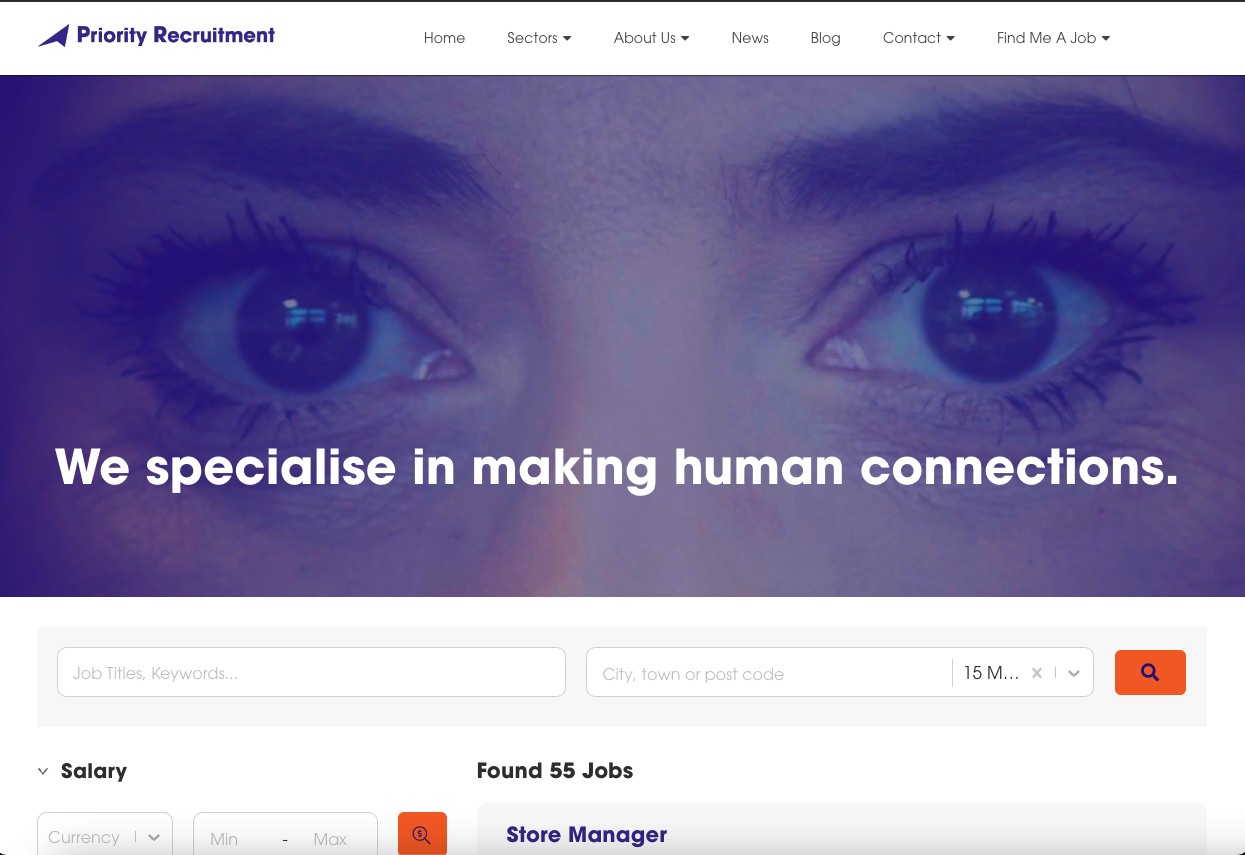
2. Choose your search criteria
Here you can choose the sector you are interested in working in, the location, the type of contract, and the salary range you would be looking for. You can also enter keywords if you're looking for a specific job title.
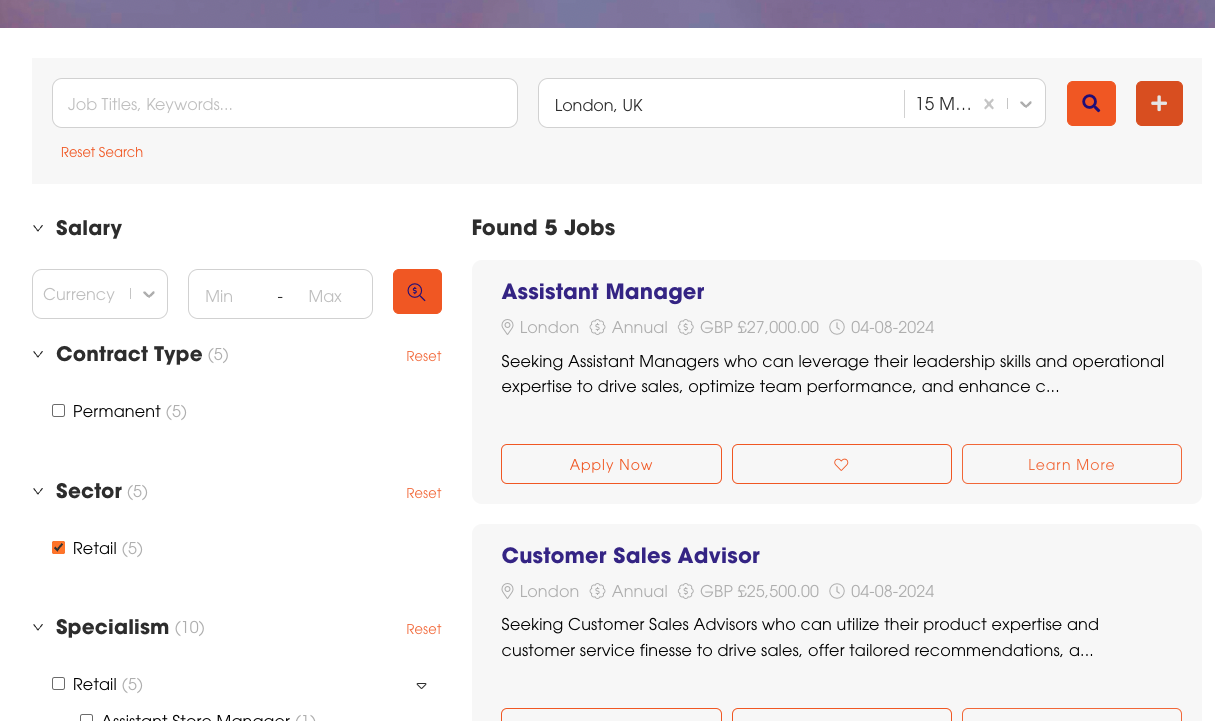
While it's important to choose the right fit for your experience, we would recommend not making this search extremely detailed - the most important bits will be the sector and location.
Equally, don't worry if the search returns 0 results - you can still set up an alert for when a job matching your criteria comes up.
3. Enter your email address & choose the frequency of the alerts
We're almost done! Once you're happy with your search, all that's left to do is enter your email address at the bottom of the page:
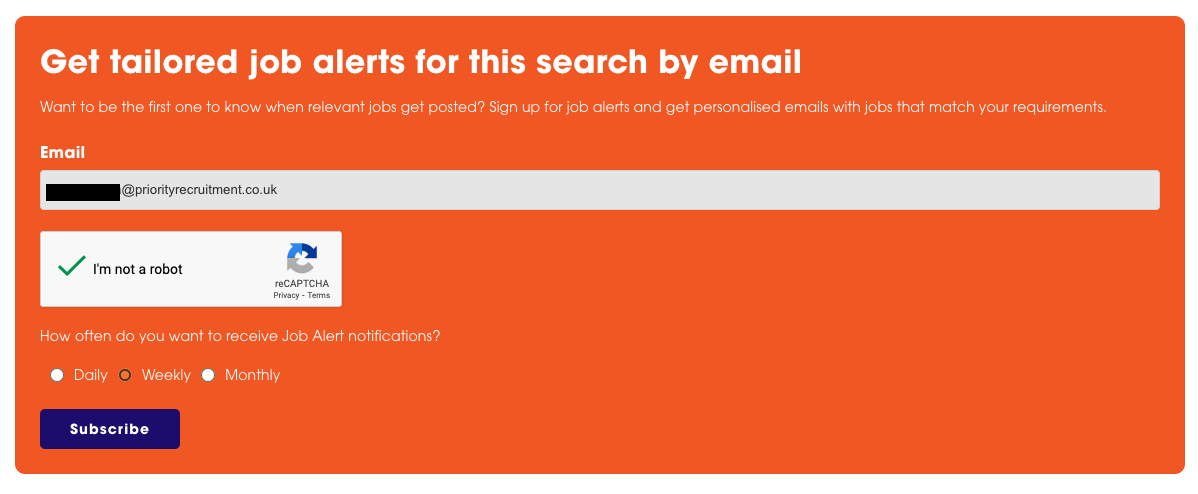
Click 'Subscribe' and that's it! You will now get an email every time a relevant job is posted.
How to set up job alerts if you are registered on our job portal
0. Check our blog on how to register if you haven't already: https://www.priorityrecruitment.co.uk/blog/how-why-to-register-on-our-website
1. Log in to your account at https://portal.priorityrecruitment.co.uk/login
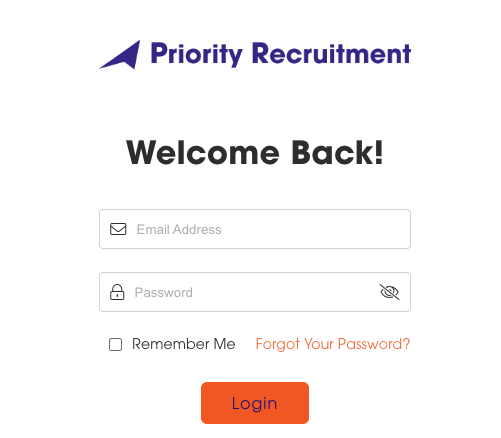
2. On your dashboard, scroll down to 'Job Alerts' and click '+Add' in the top right corner:
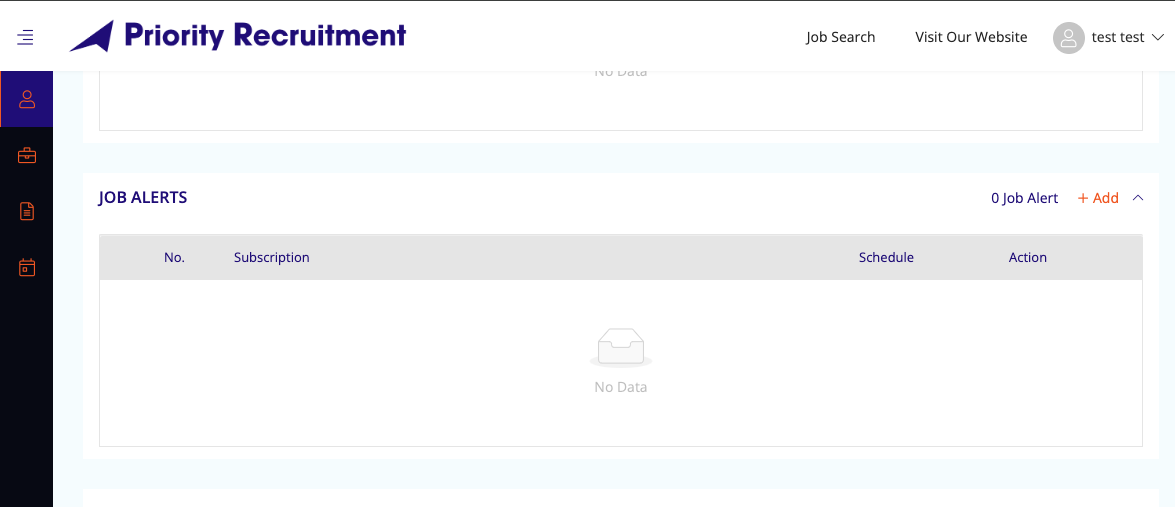
3. Set up your preferences
All you need to do now is tell us what you're looking for and choose how often you'd like to receive your job alerts (that's the 'Schedule' field).
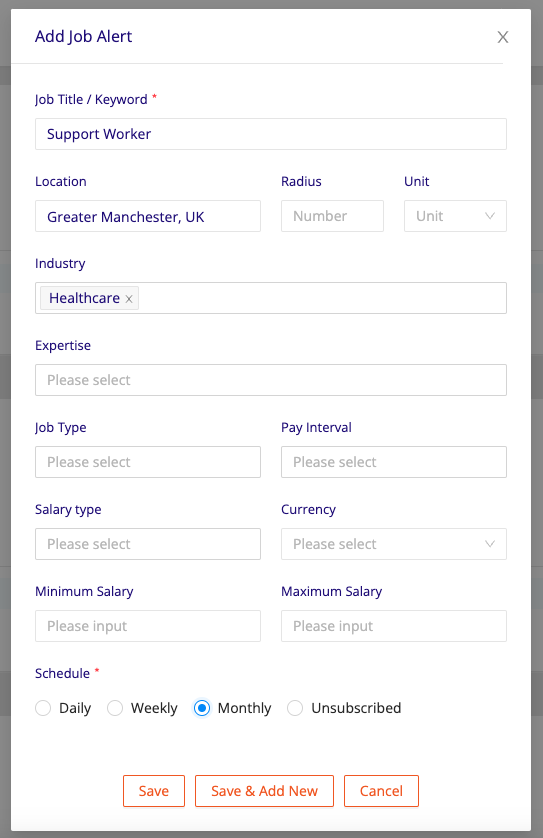
And that's all done - you can set up as many job alerts as you like and amend them as and when required.
_________
Not sure what you're looking for? Try quick uploading your CV so we can see if we have any good matches for you, or get in touch with our team directly.
Categories
Latest Blogs
-
 Navigating Support Work Staffing Challenges During the Festive SeasonThe festive season brings joy, family time, and celebrations, but for support work teams, it also comes with unique challenges.…Learn More
Navigating Support Work Staffing Challenges During the Festive SeasonThe festive season brings joy, family time, and celebrations, but for support work teams, it also comes with unique challenges.…Learn More -
 What Black Friday Reveals About the State of UK Retail HiringBlack Friday has become the clearest snapshot of how ready UK retailers really are for peak season. It is no…Learn More
What Black Friday Reveals About the State of UK Retail HiringBlack Friday has become the clearest snapshot of how ready UK retailers really are for peak season. It is no…Learn More -
 7 Common Interview Mistakes That Cost Companies Top TalentHiring top talent is challenging. Even highly qualified candidates can drop out if your interview process lacks focus. Small mistakes…Learn More
7 Common Interview Mistakes That Cost Companies Top TalentHiring top talent is challenging. Even highly qualified candidates can drop out if your interview process lacks focus. Small mistakes…Learn More
